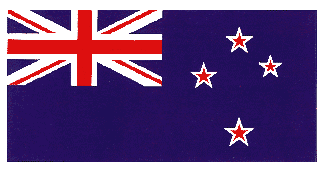
Is New Zealand Really the Third Freest Country in the World?

by John M. Cobin
John Cobin jcobin@policyofliberty.net is a Visiting Professor at Universidad Francisco Marroquín, Guatemala and is currently a Policy Consultant in Rapid City, South Dakota.
B>Quest welcomes other points of view in regard to the subject matter of this article. Click here to read an earlier version of this article in Spanish.
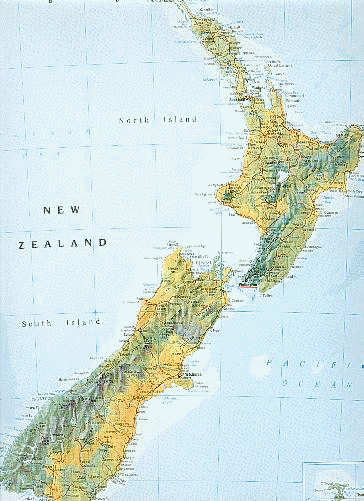 |
The Washington, D.C. based Heritage Foundation's 2000 Index of Economic Freedom, compiled by famed Austrian economist Gerald P. O'Driscoll, along with Kim R. Holmes and Melanie Kirkpatrick, provides the following list of the top 15 "freest" places on Earth. 1. Hong Kong
|
Of special interest to me are the rankings that are emphasized above: primarily third place New Zealand, but also fourth place USA, and eleventh place Chile. Each of these nations have had a reputation among classically liberal circles for years as being freer places, although each has recently elected a center left (socialist) government. New Zealand has less than 4 million people and Chile has about 15 million people, each of which are dwarfed by the USA's nearly 280 million people.
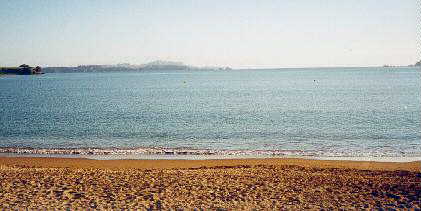
The USA's high rank has always been inflated in my view, perhaps reflecting the wishful thinking of the report's authors. (Ditto for Canada for sure, and likely for some top ten nations like the UK, Australia, and Switzerland too.)
At any rate, I would like to add some informed commentary.I recently (Spring 2000) completed a 15-day tour of New Zealand during which I was able to see the countryside, driving about 3,500 kilometers, and spending considerable time in the largest cities (five days in Auckland, four days in Wellington, and a day in Christchurch). I met with people in business, government, universities, and think tanks. Based on the Heritage Foundation ranking, I expected to find a very free society. What I found instead was quite surprising. The following is a summary of my observations New Zealand. In n some cases I contrast what I saw there with conditions in the USA and Chile.
The Bright Side
New Zealand is a nation of spectacular natural beauty which at points rivals southern Chile and the best places of the USA. Everything is clean and "tidy" with no pollution evident except a tad in downtown areas. The crime rate seems low. People seem nice and are always helpful too. There is freedom of religion. Property rights are relatively "secure", probably on par with rights in Chile, and they are ahead of the USA on account of the takings, environmentalist, and drug war crazes.
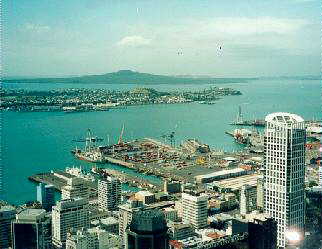
March 8, 2000 |
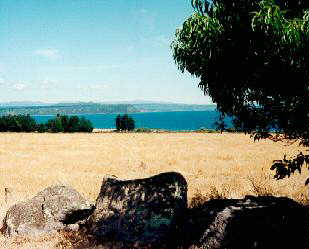
March 9, 2000 Lake Taupo, New Zealand (North Island) |
New Zealand's infrastructure is adequate, and the pavement on its roads is good, although rural roads are all narrow, usually winding, and just one lane in each direction, with dozens of one lane bridges that are surely quaint only to tourists. They have excellent harbors.
Economically, New Zealand has some laudable features. There is no visible poverty, with an enormous middle class. Tariffs are very low, perhaps 3% on average (they are 9% in Chile). There is little regulation of business. One could build houses or sell securities in New Zealand without a license. An insurance sales permit costs US$75 but does not require passing a test. The post office, airport, and many public facilities are "private," meaning that the state owns 50% of the stock and hence a "crown company" operates it. Monetary policy is "stable", insofar as central banks go. Inflation should be around 3% this year. A lot of market friendly people staff the Treasury Ministry, if that makes sense.
There are no poisonous snakes, other than political actors of course (which are more venomous).
The Grim Side
New Zealand is hardly paradise in terms of economic freedom. Income taxes are high. The tax is 19.5% on income up to NZ$38,000 (US$19,000), then 33% up to NZ$60,000 (US$30,000), and then 39% thereafter, with virtually no deductions. Some taxes for self-employed business people can be avoided by the clever use of trusts. In Chile, by contrast, graduated rates go up to 45% but the tax can be reduced to a flat 15% by simply creating a consultancy or other business (and much of that offset by expenses), which most of the richer folks do. There is a general sales tax of 12.5% on everything except financial services (the VAT is 18% in Chile by comparison).
|
March 9, 2000
|
Although I did not inquire too much into the details of the system, New Zealand also has real property, auto and other taxes. However, in making comparisons, one must consider that only the USA has a separate social security tax, while it is simply included in the New Zealand income tax rate (In Chile you are forced to pay into your own quasi-mutual fund, but you can also take it out so the only true cost is the opportunity cost of capital). The USA also has state income and/or sales taxes in addition to federal taxes, unlike either new Zealand or Chile. Thus, unless one happens to live in the Nevada desert on the Oregon border or Wyoming on the Montana border (paying low property taxes in one state and no sales tax in the other), one pays very high taxes in the USA all tolled. Real property taxes in many urban areas of the USA are outrageous (perhaps 1,000 or more per month). They are not nearly as bad in Chile and only affect the relatively wealthy. In New Zealand, a CEO told me that property taxes were pretty low, and a local retiree complained that they were outrageously high. So I a guessing that New Zealand is similar to the USA in that each has a lot of variance. In general, all three countries seem to have pretty much the same system of ad valorem auto registration taxes. There are exceptions of course. Chile has a couple of freeports in remote cities. Oregon has a flat tax of $15 per year charge on autos, and California has a flat 1% rate on real property purchase price. Yet Oregon has astoundingly high property tax rates in Portland and heavy income taxes (no sales tax), while California has both hefty sales and income taxes. It does go to show that taxation in the USA is not homogeneous, and that low taxes in one area are often offset by high taxes in another. My sense is that Americans pay higher taxes overall than folks in New Zealand and Chile pay, especially when adding into the picture the high tariffs that Americans pay on many imports. Nevertheless, that fact does not make New Zealand a tax haven by any means. |
There is a strong anti-rich culture in New Zealand. The new Prime Minister recently made headlines by calling an executive's multi-million dollar salary "revolting". She recently went to the inauguration of Chile's socialist President Ricardo Lagos to try to encourage trade ties between these two countries and to shore up ecology and Antarctica protection policies. Gun ownership, although apparently possible, is severely restricted. Chileans have less freedom in this regard than do people in the USA, but guns are available.
Welfare and unemployment doles persist. I heard of one New Zealand woman who makes US$2,400 per month on the dole and will likely do so perpetually. The dole in New Zealand might even be more lucrative than in the USA. In Chile, if you don't work, you don't eat.
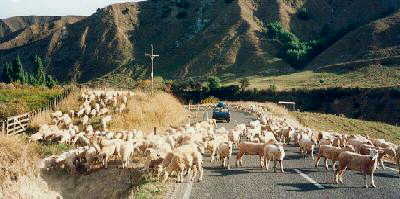
March 9, 2000 |
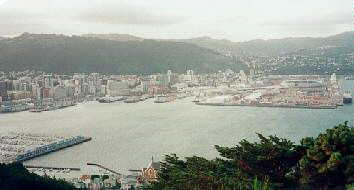
March 11, 2000 |
Medicine is socialized in New Zealand. I was told (by smiling people) not to worry if we had an accident while in New Zealand, since we would be treated for "free". I heard of one doctor who left medical practice for higher wages and more freedom working for an insurance company. Included under the social net: all vaccinations and medical care are "free" up to age 5, and dental care is "free" up to age 18. Social security is still public and basically broke. They are thinking of copying the Chilean system. I talked to one recipient who was happy to receive his monthly amount of about US$325.
Indigenous peoples (Maori) seem to get preferential treatment. The government forces the nation to be bilingual (the second language being the local indigenous one). New Zealand is "nuclear free". There are equally egregious employment acts (akin to affirmative action in the USA), although union power has apparently been decimated. Bu comparison, unions have little power in Chile. The state provides lots of housing: uniform, dull, and subject to all the pitfalls of local communism.
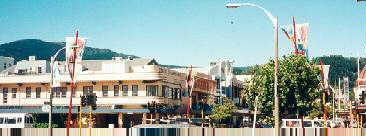
Half of the parliament in New Zealand is appointed by party bosses via a strange system which recently exalted five "green" members (including a Rostifarian I was told) to power. Some biased opinions I got suggested that the court system was as unjust as I believe it to be in the USA. That still might be better than the vastly inefficient and "guilty until proven innocent" system in Chile.
There is a Ministry of Women's Affairs where money is wasted gathering silly statistics. It exemplifies the state intrusions present in New Zealand. One of the ministry's staffers was interviewed during the prime time TV news in Auckland. I thought my wife was joking when she first told me it was being aired on the evening news. Many Americans probably savor the thought of getting such a department, but I suspect that few Chileans would.
From what I heard, public schools suffer from the same inefficiencies and low standards as they do in the USA (Children all wear uniforms in New Zealand, as they do in Chile). There are eight Universities in New Zealand — all public, bureaucratic, and politically correct. Assistant professors make US$25,000 to US$35,000 net annually. Not surprisingly, universities have had a hard time attracting and retaining junior faculty, who learn quickly that they must consult on the side to survive — unless the salary is a second income. Most economics and policy research is produced by the larger Universities at Auckland, Christchurch (Canterbury), and Wellington. Students pay small fees to attend the universities, which they complain about. I was told that government leaders are pushing to lower standards because Kiwis are having a tough time making it through the university, but I think standards are still higher than they are in Chile. Like Chile, they have an undergraduate curriculum virtually without liberal arts requirements. But at least most universities in Chile are private and not regulated (although regulation is high on the new socialist president's agenda).
|
March 14, 2000 |
March 15, 2000 |
The Social Side
In New Zealand homosexuality is widely accepted and is likely ahead of the USA in being a respected social form. The idea of marriage seems to have been displaced by the idea of "partners". By comparison, homosexuality is widely despised and derided in Chile. Abortion is rampant in New Zealand, but I do not think they have graduated to the USA level yet. Abortion is illegal (although still practiced clandestinely) in Chile. In New Zealand one would have no problem finding a prostitute via the yellow pages, newspaper, or just by visiting one of the plethora of downtown shops and shows.
The streets of New Zealand cities are full of trendy folks with tattooed bodies, pierced everything, odd colors of hair, etc. Ecology, extreme environmentalism, recycling, political correctness, multiculturalism, etc. are in the air everywhere. Church attendance is very low in general, with most churches reflecting the aforementioned "liberal" social trends. However, large families are not hated insofar as I could tell. I felt that spanking kids was frowned upon, but saw nothing to confirm any policy. My wife saw a TV ad against "smacking" however. While household maids are common in Chile, they are not in New Zealand.
New Zealand producers are mad at the USA for putting a huge tariff on lamb; mad at the UK for accepting Europe's lamb quota; and mad at Chile and other places for stealing "their" kiwi fruit and producing it more cheaply.
A lot of people are still (really) loyalists — to the British crown. Unlike in the USA, where government is often held in contempt or suspect, New Zealanders seem to have confidence in the state — much more than Chileans do. Libertarianism is a bad word, and the party only gets something like 0.1% of the vote. Anarchy (political, not social) is a held in even lower esteem.
Ecology is a "good" word. Forest product industries probably fare no better in New Zealand than in Oregon. Chile is regulated too, but there you can pay off the right bureaucrat. Major local brands boast that their products are "GM" free (i.e., contain nothing genetically manipulated).
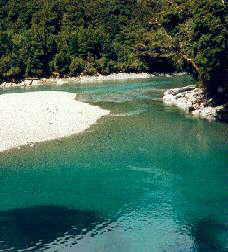
New Zealanders like sailing (They won the America's Cup 2000 and like to let you know it.), rugby, and cricket.
Other Interesting Aspects of New Zealand
Gasoline is about 50 US cents per liter (It is 60 US cents per liter in Chile and about 40 US cents in the USA.). Food prices are about the same or a little more than Chile, which is considerably more than prices in the USA. Housing prices (to buy) were probably on par with prices in a cross section of the USA, and nicer parts of Chile, and they were probably lower in terms of rentals than the USA (Like Chile, one might rent a nice big home for about US$1,200.).
Visiting New Zealand is a bargain. Car rentals, restaurants, and fine hotels are very cheap for Americans, Brits, Chileans, and Argentineans right now. A five star hotel in Auckland is US$71, a good dinner for two is US$26, and a mid-size car is US$28 per day (if you shop the local companies). Government dogs sniff your bags in the airport. One man near us was found carrying an undeclared apple.

Except in the rare case of finding a coin operated public phone, all local calls cost about 25 US cents per minute with the card one must buy! Long distance rates are relatively cheap, on par with Chile and as good as some deep discount rates in the USA too.
Homeschoolers are paid US$350 per year to homeschool their kids (the amount received evidently declines for additional kids evidently.), but they are thus subject to greater state regulation — like making a sworn statement before a Justice of the Peace (who is more or less a glorified notary public) each year that the parents are doing just as good a job as the state would do.
The national museum and all roadways are "free".
Summing Up
If New Zealand was really the 3rd freest place on earth, then, in my opinion, we would be in truly sad shape. It is interesting that the Heritage index is now used in part to decide who gets USA aid, which makes one wonder how objective results can remain. In my opinion, the Heritage Fountation has the rankings quite wrong. Even the New Zealand Business Roundtable (the leading classically liberal think tank in New Zealand) thinks that New Zealand should be dropped several notches. Furthermore, it is clear to me that Chile is a freer place than New Zealand, despite the fact that it has slid backwards lately. Note that I am not saying that Chile is free, just that it is freer than New Zealand. Nevertheless, given the outcomes of recent elections, both Chile and New Zealand are moving the wrong way, just as the USA has been doing for years.
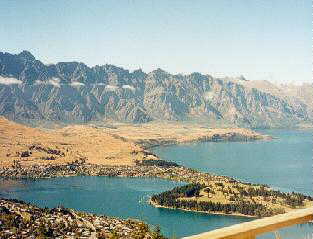
Due to its hard left social climate, I am sure that New Zealand poses some attraction for left-leaning libertarians. However, right-leaning free marketers will find many aspects of social life in New Zealand to be repulsive and even less free because government sponsors leftist cultural programs with its oppressive taxes.
New Zealand is pretty, usually friendly, and holds some nice economic features which place it ahead of the USA in my book, and surely in the top ten somewhere. But 3rd place is certainly not deserved. Perhaps Chile should be 4th or 5th and New Zealand, followed by the USA, should be a notch or two below Chile.
Judging from its Economic Freedom of the World 2000 report (which uses 1997 data) by James Gwartney and Robert Lawson, with Dexter Samida (which uses 1997 data), Canada's Fraser Institute has done no better in ranking the degree of freedom in a country than Heritage has. This report indicates that the authors of Fraser's index suffer from some of the same delusions that Heritage's does in regard to New Zealand, the USA and Chile, which are ranked 3rd, 4th, and 18th, respectively (Chile may also be found ranked 24th in another place in the same report.). In my opinion, each of these nations likely deserves being in the top ten, but the USA and New Zealand surely have inflated scores, while Chile's is too low. In the Fraser report El Salvador, Panama, Denmark, and Japan are listed as being freer than 18th ranked Chile — quite an insult to Chile to say the least!
In reviewing Fraser's methodology section, it appears that it does not weight certain evils as heavily as I think it should. Therefore, I for one contend that the rankings of both Fraser and Heritage are seriously flawed — at least insofar as New Zealand, Chile, and the USA are concerned.
